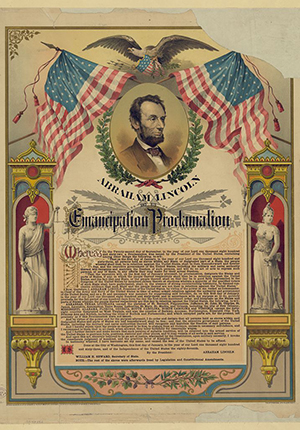Historic Document
Emancipation Proclamation (1863)
Abraham Lincoln | January 1, 1863

Library of Congress, Prints and Photographs Division
Summary
President Lincoln made no overt moves to link the suppression of the rebellion with the ending of slavery for more than two years after the outbreak of conflict. But he began making indirect moves within six months of taking office, devising a Congressionally-funded plan for compensated emancipation in the four “border states” – Delaware, Maryland, Kentucky, and Missouri (which legalized slavery but had not joined the Confederacy). He received little cooperation. Finally, in the summer of 1862, he shifted the basis for an emancipation strategy to his presumed constitutional “war powers” as commander-in-chief, presenting a draft emancipation proclamation to his cabinet in July. Although there was no consensus on the existence of such “war powers,” Lincoln issued a preliminary emancipation proclamation on September 22, 1862, and then released a final Emancipation Proclamation on January 1, 1863.
Selected by

Allen C. Guelzo
Director, Initiative on Politics and Statesmanship, James Madison Program in American Ideals and Institutions, Princeton University

Darrell A.H. Miller
Melvin G. Shimm Professor of Law at Duke University School of Law
Document Excerpt
Now, therefore I, Abraham Lincoln, President of the United States, by virtue of the power in me vested as Commander‑in‑Chief, of the Army and Navy of the United States in time of actual armed rebellion against authority and government of the United States, and as a fit and necessary war measure for suppressing said rebellion, do, on this first day of January, in the year of our Lord one thousand eight hundred and sixty‑three…order and declare that all persons held as slaves within said designated States, and parts of States, are, and henceforward shall be free; and that the Executive government of the United States, including the military and naval authorities thereof, will recognize and maintain the freedom of said persons.
And I hereby enjoin upon the people so declared to be free to abstain from all violence, unless in necessary self‑defence; and I recommend to them that, in all cases when allowed, they labor faithfully for reasonable wages.
And I further declare and make known, that such persons of suitable condition, will be received into the armed service of the United States to garrison forts, positions, stations, and other places, and to man vessels of all sorts in said service.
And upon this act, sincerely believed to be an act of justice, warranted by the Constitution, upon military necessity, I invoke the considerate judgment of mankind, and the gracious favor of Almighty God.




